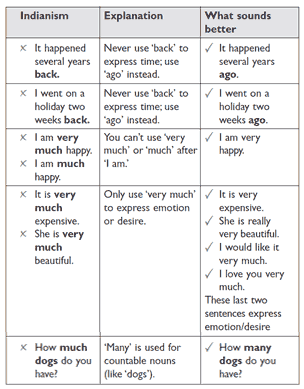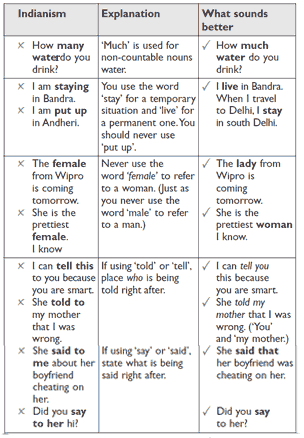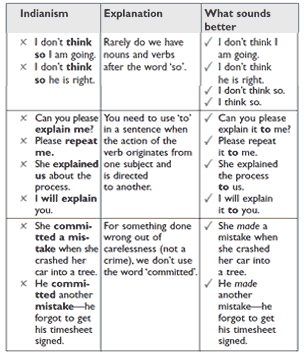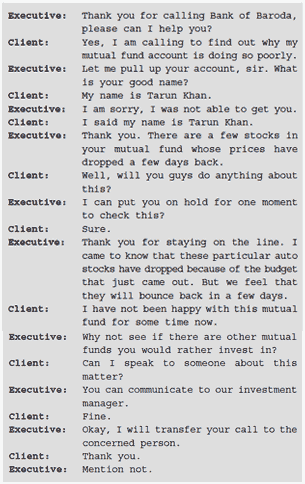
Good communication skills play a huge role in the recruitment process and job applicants who have weak skills are decidedly at a disadvantage. But what exactly are communication skills and how can you perfect yours well enough to get you your dream job?
Nasha Fitter, a teacher, entrepreneur and expert on communications and soft-skilled training, recently launched You're Hired! a book that helps job seekers improve their English communication and job placement skills.
Rediff.com will present a series of excerpts from the book over the coming weeks, and also feature chats with Nasha discussing the topics and intricacies of the job application process.
Here we present the second part of the series, What is your good name? What is your bad name? 'Indianisms' (Part 1): Grammatical errors and slang:
This is an example of a typical email I receive from people who want to work in my company. Apart from grammatical errors, this email has slang, as well as 'Indianisms' (all the words are marked in bold). Indianisms are words and phrases that are commonly used in India, but are not accepted as correct English elsewhere in the world. Multinationals do not like the use of Indianisms. Also, in most business environments around the world, slang is considered unacceptable. If you speak and write using Indianisms, you will sound unprofessional.
Dear Miss Nasha,
I am very much interested in working for you. I came to know of your company two days back. Can you say me
the concerned person whom I can send my CV to? about Nasha, her book and advice on her blog: https://nashafitter.rediffiland.com. So if you need help with your job search and career, watch this space!

Common Error 1:
What is your good name?
The correct way to ask someone their name is to simply say: What is your name?
Common Error 2:
I want to tell to the concerned person my problem.
This sentence could have been better phrased as follows: I want to speak to the person in charge about my problem.
Or, I want to speak to someone who can help me with my problem.
These are just a couple of examples. In this chapter and the next we will go over some of the most common Indianisms and slang that prevent young people from getting the jobs they want. It is extremely important that you learn to recognize Indianisms and stop yourself from using them.
What will I learn in this chapter?
13.1 Different types of Indianisms.
13.2 Putting it all together.
In our continuing series, we will featuring excerpts from You're Hired covering topics such as pronunciation, speech, accent, email, interpersonal communication and professional etiquette. The author, Nasha Fitter, will also address reader queries every Friday at 12 noon. You can read more about Nasha, her book and advice on her blog: https://nashafitter.rediffiland.com. So if you need help with your job search and career, watch this space!

Many Indianisms are formed due to errors in grammar. Others are because of slang words and phrases that have become common.
Quite a few of these phrases are old expressions left behind by the British that we are still using in India. Sometimes, there is no clear reason why an Indianism is wrong -- it just isn't a word or phrase that is globally accepted or understood.
Here are some examples of common Indianisms. Next to each one is an explanation (where possible) of why it should not be used, and examples of how you could get the same meaning across more clearly by using alternative words. Read one set at a time. Then, make flashcards to help you remember them. Don't get intimidated if you think there are too many to learn. After you read them a few times and do the exercises, you will get the hang of it!
In our continuing series, we will featuring excerpts from You're Hired covering topics such as pronunciation, speech, accent, email, interpersonal communication and professional etiquette. The author, Nasha Fitter, will also address reader queries every Friday at 12 noon. You can read more about Nasha, her book and advice on her blog: https://nashafitter.rediffiland.com. So if you need help with your job search and career, watch this space!

The following sentences contain some of the Indianisms that have been explained above. Correct them. There may be more than one way to rewrite some of the sentences. Make sure your answers are similar to the ones in the answer key.
1. I think so he will be here.
2. She came to meet me eight days back.
3. She is very much looking forward to it.
4. She always commits mistakes in class.
5. How much people will come to the party?
6. I stay in Belapur and commute to work every day by train.
7. She can tell these things to me because we are best friends.
8. The female will call you in two hours.
9. There is very much food on my plate.
10. She always explains me when I don't understand.
Solutions
1. I think he will be here.
2. She came to meet me eight days ago.
3. She is really looking forward to it.
4. She always makes mistakes in class.
5. How many people will come to the party?
6. I live in Belapur and commute to work every day by train.
7. She can say these things to me because we are best friends.
OR, She can tell me these things because we are best friends.
8. The lady will call you in two hours.
9. There is a lot of food on my plate. Or, There is so much food
on my plate.
10. She always explains things to me when I don't understand.
Or, She always explains it to me when I don't understand.
In our continuing series, we will featuring excerpts from You're Hired covering topics such as pronunciation, speech, accent, email, interpersonal communication and professional etiquette. The author, Nasha Fitter, will also address reader queries every Friday at 12 noon. You can read more about Nasha, her book and advice on her blog: https://nashafitter.rediffiland.com. So if you need help with your job search and career, watch this space!

The executive in the following sentences [in the pic alongside] has used many of the Indianisms mentioned in this chapter, as well as grammatical mistakes explained in previous chapters. Correct the mistakes. There may be more than one way to rewrite some the sentences. Make sure your answers are similar to the ones in the answer key.
Solution
Executive: Thank you for calling Bank of Baroda. How may I help you? (When asking a question, a question word must come first. Thus, 'may' should be first in this case.)
Client: Yes, I am calling to find out why my mutual fund account is doing so poorly.
Executive: Let me pull up your account, sir. What is your name?
Client: My name is Tarun Khan.
Executive: I am sorry, I did not understand you.
Client: I said my name is Tarun Khan.
Executive: Thank you. There are a few stocks in your mutual fund whose prices dropped a few days ago.
Client: Well, will you guys do anything about this?
Executive: Can I put you on hold for one moment to check this? (When asking a question, a question word must come first. Thus, 'Can' should come first.)
Client: Sure.
Executive: Thank you for staying on the line. I found out that these particular auto stocks have dropped because of the budget that just came out. But we think that they will bounce back in a few days.
Client: I have not been happy with this mutual fund for some time now.
Executive: Why don't you see if there are other mutual funds you would rather invest in?
Client: Can I speak to someone about this matter?
Executive: You can speak to our investment manager.
Client: Fine.
Executive: Okay, I will transfer your call to him now.
Client: Thank you.
Executive: You are welcome. Or, Don't mention it.
In our continuing series, we will featuring excerpts from You're Hired covering topics such as pronunciation, speech, accent, email, interpersonal communication and professional etiquette. The author, Nasha Fitter, will also address reader queries every Friday at 12 noon. You can read more about Nasha, her book and advice on her blog: https://nashafitter.rediffiland.com. So if you need help with your job search and career, watch this space!